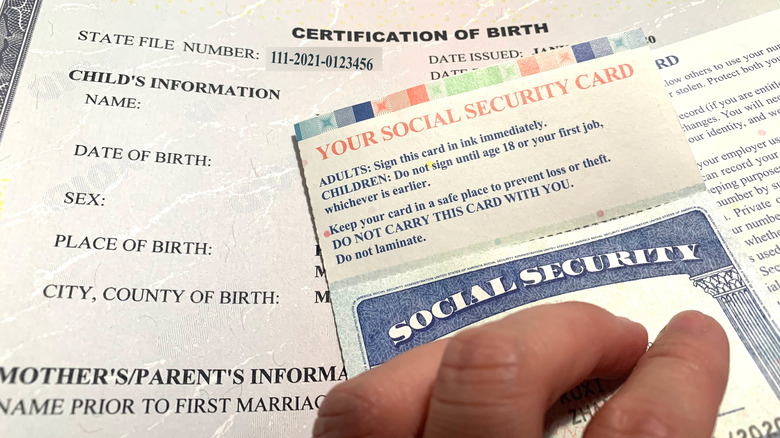How To Have Your Personal Info Removed From Google Search Results
People use Google to search for all kinds of information online — from restaurant addresses to medical conditions, and doctor ratings to meme templates. But what if your personal information is among the search results? It's a concern that many have had for quite a while and one that Google addressed back in April of 2022. In short, you can now ask Google to remove your personal information from search results.
Most folks probably don't want their home address or phone number to pop up whenever someone looks up their name. Businesses of varying shapes and sizes rely on being found in searches, sure, because in those situations you want people to be able to find you or get in touch. But if your personal details are available for anyone to find, that could leave you open to harassment, identity theft, or even physical threats.
So if you look yourself up one day and find something you really don't want other people to know, you'll probably want to get in touch with Google right away.
Will Google remove everything when I ask?
The short answer is: maybe.
While Google says that it does investigate search result removal requests, whether or not those requests are granted depends on a number of factors. Google looks at the context of the information that's being shared. Is the information a matter of public record? Would removal limit the availability of broadly useful related information? Is the information confidential? Is it being used specifically to cause harm?
Depending on the answers Google determines from those questions, your details could be removed from search results or left as-is. Or some information could be removed while other details remain — it really depends on how Google interprets the situation.
If you don't agree with a decision you can re-submit your request, however, Google requires that you supply additional materials that would potentially strengthen your case for removal. And as before, re-submitted requests are still subject to approval or denial based on what Google decides.
What kinds of information can I have removed?
"Personal details" can mean different things to different people, but Google has provided a fairly specific list of items it considers "personally identifiable info" (PII), and that would potentially qualify for removal.
Confidential details such as US social security numbers, tax IDs, Korea resident registration numbers, and so on, fall into this category. Bank account and credit card numbers and medical information do as well. Personal contact information like a home address, phone number, or email address, as well. Same with log-in credentials, images of hand-written signatures, or photos of identification documents. It's all considered PII by Google.
Google has also stated that professional contact information (addresses, phone numbers, etc) that would normally be categorized as being publicly available, and thus exempt from removal, may still be considered if it's being used to cause harm — specifically, if it's being used for doxxing.
How to ask Google to remove results
The first step is to collect all of the website links (URLs) that contain the information you want to have removed. These URLs need to be direct links, not search results. So for example, you'll want to grab the URL for the exact webpage that contains the information, and if there are images you want to remove you'll need to include direct URLs for the photos in addition to the webpage URLs. Be sure to take screenshots of each webpage as well, so Google can see exactly where and what information is being displayed. You can submit up to 1,000 URLs per report.
Once all of your information is sorted, submit a removal request. Complete the forms for each URL you submit, being sure to select the "Personal info, like ID numbers" category and then the appropriate sub-category (bank account, government ID, etc). When you're finished Google will send you an automated email to let you know the report was received, then it will start assessing everything.
In the event that more information is required, Google will contact you with specific instructions. Once a decision is made, Google will let you know what's been decided. If your information is deemed worthy of removal, it will either disappear from all search results or be cut from searches that use your name and/or aliases specifically. If Google decides your info doesn't meet the criteria for removal, it will explain why.
Things to keep in mind
It's extremely important to note that, while removing your personal information from Google search results is certainly beneficial in terms of reducing your risks of harassment or identity theft, it does not remove your information from the internet. If Google decides to fulfill your request, people won't find your info via a search but it will remain posted on all of the various websites regardless. If you want to have the information itself removed, you'll need to contact the sites that are hosting it directly and ask the webmaster to get rid of it.
You can also take additional steps to try and protect your privacy online, such as deleting your search history, clearing out browser caches, regularly changing your account passwords, and so on. None of this will get rid of personal information that's already been shared, but it could make it more difficult for those details to end up on some random website in the first place.




